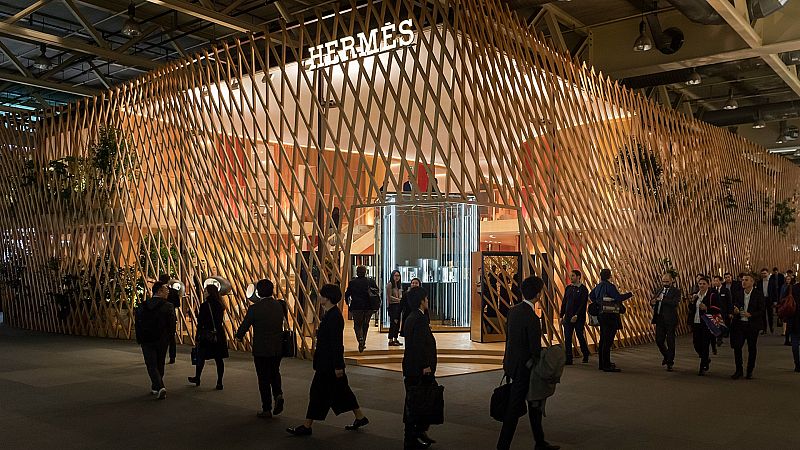
Hermès revealed during a call with analysts on Thursday that it would be increasing prices for American customers in order to offset the US’ 10% tariffs on EU goods.
These hikes, set to come into effect from 1 May, are expected to help the company protect its margins and fully compensate for the extra import costs.
Although Hermès revealed that its finances had not been impacted by US tariffs yet, according to The Wall Street Journal, the company still saw a slowdown in revenue growth in the first quarter of this year. Sales growth came to 7.2% at constant exchange rates for the first quarter of 2025, compared to a 18% surge during the same period a year earlier.
The rises will apply to all products sold in the US and will come on top of usual yearly price adjustments. So far this year, these adjustments have led to price increases of around 6% to 7% globally.
With global trade tensions escalating rapidly, several luxury companies could soon opt for cost-cutting strategies in order to maintain profit margins, or pass on costs to consumers. Several firms may withdraw or change their guidance for future revenues.
The hit to Europe's luxury sector is implicating firms like LVMH, Kering, Chanel, and Prada, especially as Trump’s 10% base tariff could rise again to 20%.
The president has paused the so-called “reciprocal” rate on the EU — and many other countries — for 90 days.
On the other hand, Trump has imposed a 145% tariff on Chinese imports, while Beijing has retaliated with its own 125% levy on US goods. The rising trade tensions will particularly affect firms that import certain components from China, as well as firms who sell luxury goods to the Chinese market.
Hermès’ share price dropped 2.5% on Thursday morning, having lost 7.3% in the last month.
Leather goods boom while luxury watches lag
The announcement came as luxury fashion giant Hermès posted slower-than-expected sales growth during the first quarter of 2025.
In Thursday's earnings report, the company recorded a total revenue of €4.13bn for the first quarter of the year. The 7.2% year-on-year lift slightly undershot expectations of 8%.
Sales in Europe, excluding France, grew 13%, whereas French sales rose 14%. Asian sales, excluding Japan, only edged up 1%, but Japanese sales soared 17%, mainly because of the loyalty of local clients.
The Americas recorded 11% sales growth in the first quarter of 2025.
The leather goods and saddlery branch saw a sales uptick of 10%, helped by the launch of the new Mousqueton and Médor bags.
Hermès also said it was expanding its production facilities, with leather goods workshops planned in Charente, Ardennes and Gironde from 2025 to 2027.
Sales in the silk and textiles divisions rose 5%, as new fabrics and formats continued to remain popular with both women and men.
Similarly, the ready-to-wear and accessories branch grew 7%. Sales were supported by the men’s autumn-winter 2025 runway show at the Palais d’Iéna, back in January, as well as the women’s autumn-winter 2025 collection, launched in March at the Garde Républicaine.
Watches lose their shine
However, the watches segment plunged 10%, despite the addition of new versions of the Arceau Le temps voyageur and the Hermès H08 models.
One reason for the dip in watch demand could be that there is an oversupply of luxury watches in the global market right now. This is linked to increased production, as well as the pandemic-induced drop in demand seen in certain markets.
Alternative watch brands, as well as vintage watches, are seeing rising interest at the moment too, which could be impacting Hermès’ watch offerings. More consumers are veering towards smartwatches as well, instead of luxury watches, which may also be contributing to dampened sales.
Similarly, stiff competition from Swiss brands such as Rolex and Patek Philippe, that are more established in the watch sector, has also affected Hermès watch sales.
The brand’s perfume and beauty department saw stable sales growth, having launched the Terre d’Hermès Eau de Parfum Intense, as well as the Rouge Brilliant Silky.
“In a complex geopolitical and economic context, the house is strengthening its fundamentals more than ever: uncompromising quality, creativity at the heart of all development, and vertical integration, a guarantee of preserving unique savoir-faire,” Axel Dumas, Executive Chairman of Hermès, said in a statement.
He continued: “Despite a high comparison basis in the first quarter, the group achieved solid growth in sales, thanks to the trust of its customers and the commitment of the teams, whom I thank warmly.”







